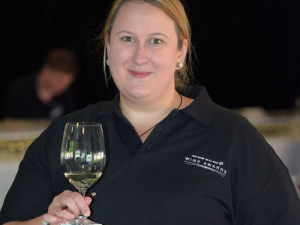But one Master of Wine has discovered, that in the UK the impact of peer reviews play a lesser role than that of “experts”, especially when it comes to purchasing wine at lower price points.
Sarah Knowles based her Master of Wine dissertation on the importance of reviews on sales of wine. In New Zealand recently as a judge at the Air New Zealand Wine Awards, she explained how her research worked and the results.
Three-thousand consumers were involved in the project, split into three even groups. One group of a thousand received an email describing the individual wine, the second group received an email with a description and a review from other consumers, while the third group received the description and a press review.
“We found that generally speaking if a wine had a review either from a peer or a press member, the wine sold better at three different price points – which were everyday, medium and high price point. But it was the customers at the lower price point who relied on a little bit more help in terms of finding a wine and that is when the experts were coming through.”
As a buyer for The Wine Society in the UK, Knowles admits she was expecting the expert reviews would impact more on the higher price point wines, not the more commercial.
“But we quickly realised that those customers were more confident in their own decision and with wines under £10, the expert review sold substantially higher levels of wine than either of the two other emails. The control email in all three price points, without any reviews, was always the weakest sale.”
Knowles says that in the UK, peer reviews via social media do not appear to have a major impact on wine sales, unlike other industries where peer reviews are obviously important. “If you were planning a holiday then you would visit somewhere like TripAdvisor or Hotels.com. But wine people are generally buying either blind without checking reviews, or else they are using some sort of expert review. Perhaps they have read something in the Sunday times and then they head out to Waitrose to buy that wine.”
Her Master of Wine dissertation, which won the Quinta do Noval award in 2015, proves the point she says that lower price point or more commercial wines still need to be marketed.
“Sometimes as an industry we can forget that the everyday wine still needs selling.”
Knowles is likely to take her own advice, when it comes to her job. Specialising in New Zealand, Australia, North America, Champagne and Spirits, her involvement with the Air New Zealand Wine Awards will provide her with a concise idea of the current lineup of our wines. Given Sauvignon Blanc is a large part of her market, she says she was very happy to see the 2017 wines on display at the show, were better than she had expected.
“Given the tricky vintage we were perhaps a little skeptical going in. But actually, we got more Golds through than we expected. So that is a positive story to take home.”
When asked what category she was most looking forward to in the judging, there was no hesitation – it was Chardonnay. She says the best of New Zealand Chardonnays are “very, very good.” But she bemoaned the lack of a New Zealand direction when it comes to this variety.
“I think New Zealand Chardonnays tend to be a little all over the place. I think there seems to be difficulty working out what the New Zealand style is, if there can be one with Chardonnay.”
Given White Burgundy is The Wine Society’s largest selling white wine and has been “forever”, she said New Zealand has a hard road to toe if it wants to break into that market in the UK. While sales are experiencing growth, she said it is not significant in relation to the volume of New Zealand wines they sell. Her advice to New Zealand winemakers is to look to what white Burgundy offers consumers and try to replicate.
“For my membership, who are probably drinking a large proportion of white Burgundy and reasonably inexpensive white Burgundy, they are looking for bright acidity, probably slightly earlier picking dates which also correlates to 12.5 or 13 percent alcohol, so a lighter body. Then in an ideal world it will be fermented in oak, but not a high proportion of new. I think they would like some complexity with that, which may be fermenting with higher solids for some reduction – but probably reduction to the point that most consumers wouldn’t notice it - but it adds some minerality and freshness to a wine. Then it would be on lees for a reasonable period to give it some texture and bottled just after a year. That would be the traditional Burgundian way of making a house level Chardonnay.”
In terms of other varieties or styles, Knowles says she believes New Zealand sparkling wines are an unsung hero, and could do with more of a push into the UK market. The only problem she admitted was that our sparklings were often a comparable price to some Champagnes.
“When I look at shops in New Zealand the wines are half the price of Champagne and that makes perfect sense. If they were half the price of Champagne in the UK, it would be very great value, but that doesn’t seem to happen. They tend to be closer in price point.”
Knowles was one of three intentional judges at this year’s Air New Zealand Wine Awards. The other two were Elaine Chukan Brown from the US and PJ Charteris a New Zealander who makes wine in both Central Otago and Australia.












